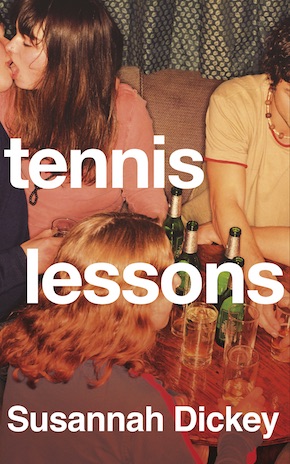The Deer’s Leap
by Susannah Dickey
“This is a raw, fierce, shockingly honest coming-of-age story. Tennis Lessons heralds the arrival of a startling new voice in literary fiction.” Louise O’Neill
You drive slowly, your eyes flickering from the twisty uphill roads to the flickering dashboard clock. In the dense, oppressive heat of the car your smell seems to mix with that of the warm upholstery. It reminds you of the inside of a pet shop – moist and stale. It smells like pellets and fur and shit. You turn the dial of the air conditioning up and point the fan at your face until your eyes prickle and the hairs on your arms stand on end. The small blue pillow hanging from the mirror sways back and forth.
The skin on the backs of your hands starts to itch from the cold air. Not aware you are going to do it until you do, you turn the car suddenly and violently into a narrow side street. The car rocks to one side and a prolonged honk comes from behind you. Without slowing you pull the car up on to the kerb and then brake. The tyres squeal and everything leans forward for a moment before jerking back. You grip the steering wheel, breathing heavily. You get out of the car.
The pub at the top of the street has been a Wetherspoons for as long as you can remember, but the old wooden sign is still outside; it has a silhouette of deer on a hill. You remember a conversation between two hedgehogs, from a cartoon you watched when you were little:
‘I wonder what White Deer Park looks like.’
‘Lots of white deer, I suppose.’
It was here that you met Donal, the beautiful musician with the Cheestring legs for the first time. It was also here that you met him for drinks a week after. Three weeks from now, when exam season is over, the students in your year will come here for cheap shots of tequila and vodka with lemonade. You will be eighteen by then. Everyone will wear their school shirts, newly ruined with felt-tip signatures and crude drawings. The beautiful girls will wear their shirts knotted just below their breasts; the popular boys will have their ties tied around their heads. The thought of going makes you anxious. The thought of not going makes you anxious.
The pub’s smoking area is shaded and moody looking, with empty barrels flung across it as decor. Most of the tables are empty, although one has an elderly man reading a newspaper, and another a middle-aged couple, sitting across from one another. As you stand in the doorway you wish you’d taken your blazer off – it feels heavy across your shoulders. You listen to the laughter of the middle-aged couple, too raucous and joyful, like teenagers in an ad for skincare products. You watch them.
You picture it. You picture the woman nervously adjusting the plum dust ruffle on her bed, anticipating his arrival. You picture him standing outside. You want so desperately to make it ugly, but it isn’t.”
You know your father from the back, from years spent staring at his head from the back seat of the car. You know the thinning brown-grey hair that forms an earthy Catherine wheel; at its centre a patch of numinous scalp. He’s wearing a striped shirt and the flesh of his neck blurs the edge of the collar. Sitting opposite him is a woman. She has glossy black hair in a bob and its colour is too stark against the smoking area’s soft lighting. Every hair looks like it has been individually lacquered and the result is disconcerting, like a CGI simulation of hair. She is wearing dark-purple lipstick. It has bled into the rivulets around her mouth and, unlike her hair, her mouth is slightly out of focus, like two slug-shaped bruises meeting at either end. When she smiles you can see that one of her front teeth is dark with a smudge of purple, and you can imagine pressing a finger against it and feeling the tooth give under the pressure. You stand at the edge of the smoking area for a while, watching them, before edging over to the closest picnic table. You lower yourself on to a bench. You lift your legs over the beam and slide them under the table, keeping your eyes fixed on the woman.
She’s wearing a sleeveless dress. You follow the line of her arm, from the bare shoulder down the upper arm – it has a pronounced curve of muscle – to the elbow resting on the wooden table to the forearm to the chunky gold bangle on the wrist to the back of the hand. You think you can almost make out the fraying constellation of lentigines when she scratches her nose. When she lowers her hand she coils her fingers up with your father’s. You put your hand in your pocket and crunch the foil of the silver pill packet between your fingers, the packet with only one blue, diamond-shaped pill remaining.
You picture it. You picture the woman nervously adjusting the plum dust ruffle on her bed, anticipating his arrival. You picture him standing outside. He checks his reflection in the brass doorbell before pressing it – he’s been looking forward to this for days. You picture her giggling as he presents a bottle of red wine and kisses her cheek. You hear the wet slur of their words as their teeth get blacker and their eyes get redder. You picture your father fumbling in the bathroom with the foil packet, popping one of the diamonds out from its see-through bubble. You picture him swallowing it, wedging his head under the tap, straightening up, performing a jumpy dance while he waits. He smiles as he feels the pill smooth the creases in the fabric of his cock, feels it rise jerkily like the arm of a crane. You picture him looming over the woman with the glossy hair, filling her up and steering her, her blurry lips parted and the black arches of her gums and the smudge on her tooth exposed. You hear their breathing as they lie side by side on the rumpled bed sheets afterwards, the lights dimmed.
You want so desperately to make it ugly, but it isn’t. You picture him lifting one arm and you picture her rolling towards him and you picture him holding her for as a long as possible before he has to go. You picture him leaving, the apology in his smile, the sadness in hers. You picture her returning to the bathroom to make eye contact with herself. She slides in the plastic retainer that lives on the edge of the sink and makes her feel like a teenager.
You know now that this is what your father does. When you call him and he doesn’t answer or when he comes in late on a Friday night and shakes the ill-fitting wooden doors in their frames; when he’s sitting at the kitchen table staring blankly at the crack in the wall, his mouth ajar, it is because of this woman. This normal-looking woman is the reason your father has cause to smile at nothing, when nothing has been said. What reason would he have otherwise, to smile? This woman with the glossy hair in the sleeveless dress is laughing at something he has said. When was the last time he made a woman laugh?
You know now that this is what your father does. When you call him and he doesn’t answer or when he comes in late on a Friday night and shakes the ill-fitting wooden doors in their frames.”
The woman has stood up from the table. You see her mouth move around the words ‘ladies’ room’, and you wonder if it is important to her that your father doesn’t think of her sitting on a toilet seat with her thighs spread and her dress in folds around her middle. As her arms press themselves to her sides teardrop-shaped pillows of flesh appear at her armpits. You have the same droplets when you wear sleeveless tops. You always try to press them inwards so they stay concealed. This requires rigorous attention so instead you have decided to not wear sleeveless tops at all. That this woman has the same problem and has chosen to either not care or to conceal her discomfort fills you with a mixture of warmth and pity. A moment later it occurs to you that perhaps she doesn’t view the teardrop folds of fat under her arms as a problem at all, as something that needs to be solved, and this fills you with a different feeling.
She circles the table. As she passes your father she puts her hand on his shoulder and kisses the top of his head, right on the spot where he has a raised, tan mole, and you feel the jerk of nausea in your throat. She crosses the smoking area, her heels clacking on the paving stones. She is swallowed by the pub and your father puts his hand to his back pocket and slides out his phone. You sit, inert, and wish you had tried to call him earlier, so that he could see your name on the screen now and feel guilty.
You keep your hand firm on the pill packet and wonder if your father can sense its closeness. You run your thumb over the popped domes on the blister pack. You finger it faster and faster, until you’re amazed the others in the garden can’t hear the metallic crackle. What you are feeling, more than anything else, is something like relief.
from Tennis Lessons (Doubleday, £14.99)
 Susannah Dickey grew up in Derry and now lives in Belfast. She is the author of two poetry pamphlets published by The Lifeboat: I had some very slight concerns (2017) and genuine human values (2018). Her poetry has been published in Ambit, The White Review, Poetry Ireland Review, Magma and elsewhere. In 2018 she was shortlisted for The White Review Short Story Prize, and in 2017 she was the winner of the inaugural Verve Poetry Festival competition. Tennis Lessons, her debut novel, is published in hardback, eBook and audio download by Doubleday/Penguin.
Susannah Dickey grew up in Derry and now lives in Belfast. She is the author of two poetry pamphlets published by The Lifeboat: I had some very slight concerns (2017) and genuine human values (2018). Her poetry has been published in Ambit, The White Review, Poetry Ireland Review, Magma and elsewhere. In 2018 she was shortlisted for The White Review Short Story Prize, and in 2017 she was the winner of the inaugural Verve Poetry Festival competition. Tennis Lessons, her debut novel, is published in hardback, eBook and audio download by Doubleday/Penguin.
Read more
@SusannahDickey
@DoubledayUK

